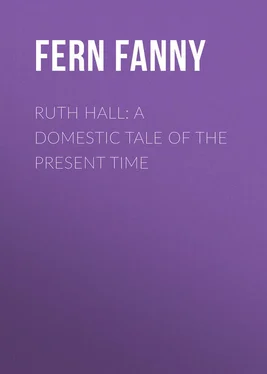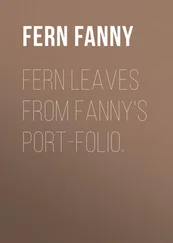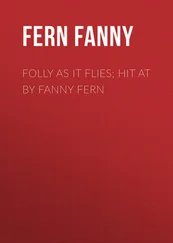Fanny Fern - Ruth Hall - A Domestic Tale of the Present Time
Здесь есть возможность читать онлайн «Fanny Fern - Ruth Hall - A Domestic Tale of the Present Time» — ознакомительный отрывок электронной книги совершенно бесплатно, а после прочтения отрывка купить полную версию. В некоторых случаях можно слушать аудио, скачать через торрент в формате fb2 и присутствует краткое содержание. Жанр: foreign_antique, foreign_prose, на английском языке. Описание произведения, (предисловие) а так же отзывы посетителей доступны на портале библиотеки ЛибКат.
- Название:Ruth Hall: A Domestic Tale of the Present Time
- Автор:
- Жанр:
- Год:неизвестен
- ISBN:нет данных
- Рейтинг книги:3 / 5. Голосов: 1
-
Избранное:Добавить в избранное
- Отзывы:
-
Ваша оценка:
- 60
- 1
- 2
- 3
- 4
- 5
Ruth Hall: A Domestic Tale of the Present Time: краткое содержание, описание и аннотация
Предлагаем к чтению аннотацию, описание, краткое содержание или предисловие (зависит от того, что написал сам автор книги «Ruth Hall: A Domestic Tale of the Present Time»). Если вы не нашли необходимую информацию о книге — напишите в комментариях, мы постараемся отыскать её.
Ruth Hall: A Domestic Tale of the Present Time — читать онлайн ознакомительный отрывок
Ниже представлен текст книги, разбитый по страницам. Система сохранения места последней прочитанной страницы, позволяет с удобством читать онлайн бесплатно книгу «Ruth Hall: A Domestic Tale of the Present Time», без необходимости каждый раз заново искать на чём Вы остановились. Поставьте закладку, и сможете в любой момент перейти на страницу, на которой закончили чтение.
Интервал:
Закладка:
“Will you please hand me that camphor bottle?” said Ruth, laying her hand upon her throbbing forehead.
“How’s my little snow-drop to-day?” said Harry, entering Ruth’s room as his mother swept out; “what ails your eyes, Ruth?” said her husband, removing the little hands which hid them.
“A sudden pain,” said Ruth, laughing gaily; “it has gone now; the camphor was too strong.”
Good Ruth! brave Ruth! Was Harry deceived? Something ails his eyes, now; but Ruth has too much tact to notice it.
Oh Love! thou skilful teacher! learned beyond all the wisdom of the schools.
CHAPTER X
“You will be happy here, dear Ruth,” said Harry; “you will be your own mistress.”
Ruth danced about, from room to room, with the careless glee of a happy child, quite forgetful that she was a wife and a mother; quite unable to repress the flow of spirits consequent upon her new-found freedom.
Ruth’s new house was about five miles from the city. The approach to it was through a lovely winding lane, a little off the main road, skirted on either side by a thick grove of linden and elms, where the wild grape-vine leaped, clinging from branch to branch, festooning its ample clusters in prodigal profusion of fruitage, and forming a dense shade, impervious to the most garish noon-day heat; while beneath, the wild brier-rose unfolded its perfumed leaves in the hedges, till the bees and humming-birds went reeling away, with their honeyed treasures.
You can scarce see the house, for the drooping elms, half a century old, whose long branches, at every wind-gust, swept across the velvet lawn. The house is very old, but Ruth says, “All the better for that.” Little patches of moss tuft the sloping roof, and swallows and martens twitter round the old chimney. It has nice old-fashioned beams, running across the ceiling, which threaten to bump Harry’s curly head. The doorways, too, are low, with honeysuckle, red and white, wreathed around the porches; and back of the house there is a high hill (which Ruth says must be terraced off for a garden), surmounted by a gray rock, crowned by a tumble-down old summer-house, where you have as fine a prospect of hill and valley, rock and river, as ever a sunset flooded with rainbow tints.
It was blessed to see the love-light in Ruth’s gentle eyes; to see the rose chase the lily from her cheek; to see the old spring come back to her step; to follow her from room to room, while she draped the pretty white curtains, and beautified, unconsciously, everything her fingers touched.
She could give an order without having it countermanded; she could kiss little Daisy, without being called “silly;” she could pull out her comb, and let her curls flow about her face, without being considered “frivolous;” and, better than all, she could fly into her husband’s arms, when he came home, and kiss him, without feeling that she had broken any penal statute. Yes; she was free as the golden orioles, whose hanging nests swayed to and fro amid the glossy green leaves beneath her window.
But not as thoughtless.
Ruth had a strong, earnest nature; she could not look upon this wealth of sea, sky, leaf, bud, and blossom; she could not listen to the little birds, nor inhale the perfumed breath of morning, without a filling eye and brimming heart, to the bounteous Giver. Should she revel in all this loveliness, – should her heart be filled to its fullest capacity for earthly happiness, and no grateful incense go up from its altar to Heaven?
And the babe? Its wondering eyes had already begun to seek its mother’s; its little lip to quiver at a harsh or discordant sound. An unpracticed hand must sweep that harp of a thousand strings; trembling fingers must inscribe, indelibly, on that blank page, characters to be read by the light of eternity: the maternal eye must never sleep at its post, lest the enemy rifle the casket of its gems. And so, by her child’s cradle, Ruth first learned to pray. The weight her slender shoulders could not bear, she rolled at the foot of the cross; and, with the baptism of holy tears, mother and child were consecrated.
CHAPTER XI
Time flew on; seasons came and went; and still peace brooded, like a dove, under the roof of Harry and Ruth. Each bright summer morning, Ruth and the little Daisy,(who already partook of her mother’s love for nature,) rambled, hand in hand, through the woods and fields, with a wholesome disregard of those city bug-bears, sun, dew, bogs, fences, briers, and cattle. Wherever a flower opened its blue eye in the rock cleft; wherever the little stream ran, babbling and sparkling, through the emerald meadow; where the golden moss piled up its velvet cushion in the cool woods; where the pretty clematis threw the graceful arms of youth ’round the gnarled trunk of decay; where the bearded grain, swaying to and fro, tempted to its death the reaper; where the red and white clover dotted the meadow grass; or where, in the damp marsh, the whip-poor-will moaned, and the crimson lobelia nodded its regal crown; or where the valley smiled in its beauty ’neath the lofty hills, nestling ’mid its foliage the snow-white cottages; or where the cattle dozed under the broad, green branches, or bent to the glassy lake to drink; or where, on the breezy hill-tops, the voices of childhood came up, sweet and clear, as the far-off hymning of angels, – there, Ruth and her soul’s child loved to linger.
It was beautiful, yet fearful, to mark the kindling eye of the child; to see the delicate flush come and go on her marble cheek, and to feel the silent pressure of her little hand, when this alone could tell the rapture she had no words to express.
Ah, Ruth! gaze not so dotingly on those earnest eyes. Know’st thou not,
The rose that sweetest doth awake,
Will soonest go to rest?
CHAPTER XII
“Well,” said the doctor, taking his spectacles from his nose, and folding them up carefully in their leathern case; “I hope you’ll be easy, Mis. Hall, now that we’ve toted out here, bag and baggage, to please you, when I supposed I was settled for the rest of my life.”
“ Fathers can’t be expected to have as much natural affection, or to be as self-sacrificing as mothers ,” said the old lady. “Of course, it was some trouble to move out here; but, for Harry’s sake, I was willing to do it. What does Ruth know about house-keeping, I’d like to know? A pretty muss she’ll make of it, if I’m not around to oversee things.”
“It strikes me,” retorted the doctor, “that you won’t get any thanks for it – from one side of the house, at least. Ruth never says anything when you vex her, but there’s a look in her eye which – well, Mis. Hall, it tells the whole story.”
“I’ve seen it,” said the old lady, while her very cap-strings fluttered with indignation, “and it has provoked me a thousand times more than if she had thrown a brick-bat at my head. That girl is no fool, doctor. She knows very well what she is about: but diamond cut diamond, I say. Doctor, doctor, there are the hens in the garden. I want that garden kept nice. I suppose Ruth thinks that nobody can have flowers but herself. Wait till my china-asters and sweet peas come up. I’m going over to-day to take a peep round her house; I wonder what it looks like? Stuck full of gimcracks, of all sorts, I’ll warrant. Well, I shan’t furnish my best parlor till I see what she has got. I’ve laid by a little money, and – ”
“Better give it to the missionaries, Mis. Hall,” growled the doctor; “I tell you Ruth don’t care a pin what you have in your parlor.”
“Don’t you believe it,” said the old lady.
Читать дальшеИнтервал:
Закладка:
Похожие книги на «Ruth Hall: A Domestic Tale of the Present Time»
Представляем Вашему вниманию похожие книги на «Ruth Hall: A Domestic Tale of the Present Time» списком для выбора. Мы отобрали схожую по названию и смыслу литературу в надежде предоставить читателям больше вариантов отыскать новые, интересные, ещё непрочитанные произведения.
Обсуждение, отзывы о книге «Ruth Hall: A Domestic Tale of the Present Time» и просто собственные мнения читателей. Оставьте ваши комментарии, напишите, что Вы думаете о произведении, его смысле или главных героях. Укажите что конкретно понравилось, а что нет, и почему Вы так считаете.












